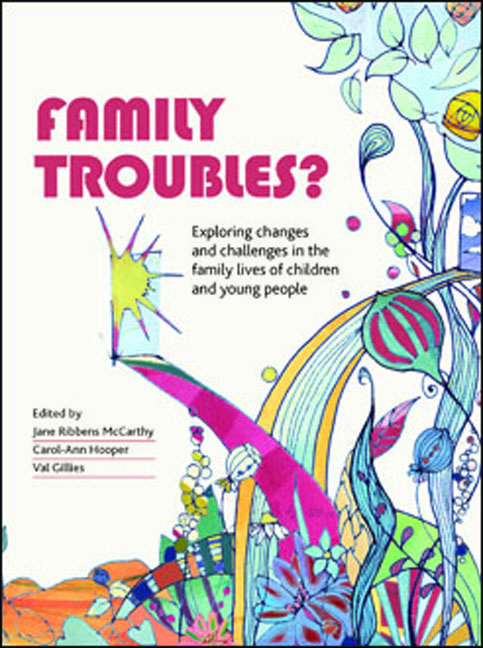Book contents
- Frontmatter
- Contents
- Notes on contributors
- Foreword
- Preface
- 1 Troubling normalities and normal family troubles: diversities, experiences and tensions
- Part One Approaching family troubles ? Contexts and methodologies :Introduction to Part One
- Part Two Whose trouble ? Conteste d definitions and practice: Introduction to Part Two
- Part Three The Normal, The Troubling And The Harmful?: Introduction to Part Three
- Part Four Troubles and transitions across space and culture: Introduction to Part Four
- Part Five Working With Families: Introduction to Part Five
- Index
21 - European perspectives on parenting and family support
Published online by Cambridge University Press: 07 September 2022
- Frontmatter
- Contents
- Notes on contributors
- Foreword
- Preface
- 1 Troubling normalities and normal family troubles: diversities, experiences and tensions
- Part One Approaching family troubles ? Contexts and methodologies :Introduction to Part One
- Part Two Whose trouble ? Conteste d definitions and practice: Introduction to Part Two
- Part Three The Normal, The Troubling And The Harmful?: Introduction to Part Three
- Part Four Troubles and transitions across space and culture: Introduction to Part Four
- Part Five Working With Families: Introduction to Part Five
- Index
Summary
Support for parents and families has been a key aspect of policy across government departments in most European countries over recent years. The policy drivers for this emphasis also have some commonalities across countries, including concern with agendas of social inclusion (eg Hantrais, 2004). But there are also important differences between countries in the position of parental support relative to wider policy frameworks for children and families, and beyond that, to wider discourses about the rights of parents and children, and the role of the state in family life. For example, what do policymakers and service providers aim to do when they intervene with families and their ‘troubles’? Do families have a right to support in dealing with the troubles they face? Or are policy and services designed to address aspects of family life that are troubling to the ‘normal’, as discussed earlier in this volume? How do such understandings of the purpose of support inform the design and delivery of parent and family support services?
This chapter considers these questions in the context of two studies commissioned by the UK government and conducted in Europe. The studies examined policy and services in relation to ‘mainstream’ parenting and family support, and targeted support for families of young people where placement away from home is being planned or considered. In discussing these studies together, the chapter will examine continuities – and disjunctures – between ‘universal’ and ‘targeted’ services, considering both the conceptualisation of the work (in policy and practice) and its implementation.
The studies
Working at the ‘edges’ of care? (Boddy et al, 2008, 2009a)
Conducted in England, Denmark, France and Germany, this study was concerned with support for young people (aged 10–15 years old) and their families when placement away from home was being planned or considered. The study's title stems from a government policy document – the Care matters Green Paper (DfES 2006) – which coined the phrase ‘at the edge of care’ to refer to children in this situation. The research was concerned with policy, professional skills and practice, and sought to understand better the ways in which care entry can be prevented, or planned and supported.
- Type
- Chapter
- Information
- Family Troubles?Exploring Changes and Challenges in the Family Lives of Children and Young People, pp. 263 - 278Publisher: Bristol University PressPrint publication year: 2013

